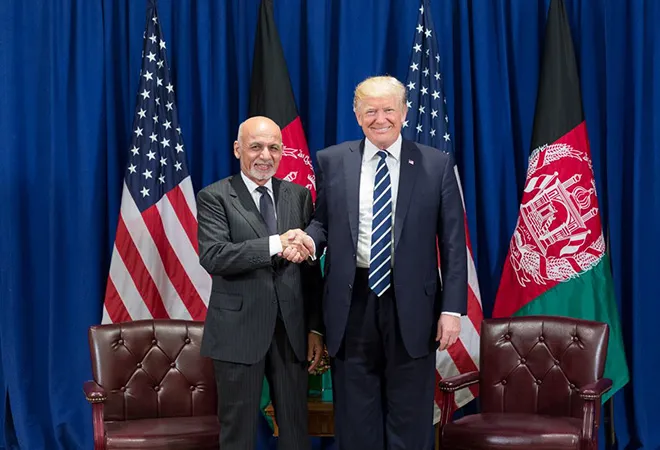-
CENTRES
Progammes & Centres
Location

There is something quite surreal about the optimism and anticipation attached to the ‘peace' talks being held between the US and the Taliban. Apart from those insidiously, and in some cases shamelessly, plugging the Pakistani line to ‘trust the Taliban’, anyone with the slightest idea about Afghan dynamics in general and the Taliban obduracy in particular, knows that these talks are not going to end well — neither for Afghanistan, nor for the region, and certainly not for the global war on terror.
The positive spin on the ‘progress’ in these talks by US envoy Zalmay Khalilzad is at best sugar coating the poison pill.
From whatever has emerged in the public domain, it seems that the so- called agreement on the draft of the framework for peace is steeped in favour of the Taliban. While the US is committing to something tangible — withdrawal of its forces from Afghanistan — the Taliban's assurances are fungible.
Its past track record on commitments is pretty dismal and there is no reason to think that the Taliban has changed over the years.
Its assurances that it will not monopolise power; allow international jihadists; and will soften its stand on women and the minorities are not worth the paper they are written on. The Taliban is wont to monopolise power.
Those rooting for the Taliban claim they are Afghan nationalists and not jihadists. Regardless of this binary the
Taliban will not sever its links with International jihadist groups. As Islamists, they have deep fraternal, ideological and personal links with these forces.
They that do not pose a challenge to the Taliban and are duty bound to give them sanctuary.
The Afghans code obligates them to give protection to anyone who seeks it. The argument that the Taliban has learnt its lesson and will not support organisations like the A1 Qaeda type is only a self-serving one.
The Taliban has re-grouped, revived and is now on the verge of wanning back what it lost, all this fighting hand-in-hand with the Al Qaeda and other Islamist jihadist groups. The links that foreign jihadists established over the last 15-odd years with the Taliban makes them brothers-in-arms.
To expect the Taliban to simply cast them aside amounts to naivete. Of course, the Taliban will not allow the Islamic State (which was born from the Taliban’s womb in the Af-Pak region) to establish itself in Afghanistan, but only because it is perceived as a threat by the Taliban.
The Taliban’s assurance on women and minorities contradicts what it has been doing in areas where it holds sway.
If anything, the Taliban of today is even more radical reactionary and brutal than the original lot.
The biggest problem with the ‘peace’ talks is that while there will be many (read: the European Union) who will offer to stand guarantee, no one is ready to enforce the terms of agreement if the Taliban violates it.
The bottom line is that the Taliban is smart enough to know that the US is negotiating with a very weak hand.
It will exploit this to the hilt to extract the maximum out of the US while conceding only lollipops in the name of 'major concessions’. The entire trajectory of talks is determined by one variable: the impetuousness of US President Donald Trump.
The Taliban is banking on Trump to lose patience with the talks and decide to leave Afghanistan even without a fig leaf of an agreement. They will string the talks for as long as they can.
On the other hand, Khalilzad is scared that his boss may pull the rug from under him. so he is in a hurry to wrap up things. This is why he seems to be making big concessions in return for peanuts.
The most untenable laughable part of these talks is the suggestion that by sign- a deal with the Taliban, the US will be e to keep some of its prestige intact to disguise an otherwise humiliating defeat.
No matter how anyone spins it, the defeat is palpable in the desperation dictating the talks. What is critical is how the Taliban and Islamists around the world look at what is happening in Afghanistan. The jihadists are gloating about a glorious victory. The repercussions of this will be cataclysmic, not just for the region but for the entire world.
Instead of expecting anything positive to come from these talks. India must start preparing for the fallout.
This means doubling-down on support for anti-Taliban forces in Afghanistan and tightening the security grid at home.
With everyone focused on the General Elections, national security is at a deep discount.
This commentary originally appeared in The Mail Today.
The views expressed above belong to the author(s). ORF research and analyses now available on Telegram! Click here to access our curated content — blogs, longforms and interviews.

Sushant Sareen is Senior Fellow at Observer Research Foundation. His published works include: Balochistan: Forgotten War, Forsaken People (Monograph, 2017) Corridor Calculus: China-Pakistan Economic Corridor & China’s comprador ...
Read More +